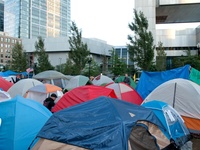
Tents fill Dewey Square Park, in Boston’s financial district as people participate in the Occupy Boston protests.
Three weeks ago Monday, Dan the Bagel Man was urging crowds of protesters to lock arms and resist an impending police raid on a small park across from Dewey Square.
Last Friday, Dan’s distinctive military-style cap, covered in anti-war protest buttons, was still easy to pick out in Occupy Boston’s Tent City. But as the protest approaches its second month, the Bagel Man spends more of his time handing out food and washing dishes.
Dan, whose nickname comes from his former job as a bagel vendor, is one of a few stalwart protesters that have stayed with Occupy Boston since the protest, inspired by demonstrations on Wall Street in New York City, began in Boston’s financial district. But as the protests continue and temperatures drop, many observers question where the Occupy movement is going.
“Is this a moment or a movement?” says Marshall L. Ganz, a senior lecturer in public policy at the Kennedy School of Government.
Ganz, who participated in a teach-in at Dewey Square, is one of many in the Harvard Community who have an interest in the protest—at least five Harvard students and alumni were arrested on Oct. 10, the night of the raid. And as the protest closes out its first month, many University professors are weighing in on the relevance and viability of Occupy Wall Street and its Boston counterpart.
‘POLARIZE TO MOBILIZE’
Ganz knows a thing or two about protest movements. He organized for the Student Nonviolent Coordinating Committee in the 1960s, and later worked with Cesar Chavez and the United Farm Workers.
“It’s amazing that there hasn’t been more action,” Ganz says about the underlying reasons that prompted the Occupy protests. He says that he is surprised that the hardships caused by the economic crisis have not precipitated more turbulence.
But, according to Ganz, the current domestic unrest is a positive sign. “You have to polarize to mobilize,” he says, explaining his belief that civil unrest is an essential part of healthy democracy. “The way the public gets educated is through controversy,” says Ganz. “After all, democracy is a constructive form of contention.”
And the “occupiers” have seen plenty of contention. Although the Dewey Square encampment has been more tranquil than its New York City counterpart, Boston Police arrested more than 100 protesters on Oct. 10 after they expanded into a small park across the street. In other parts of the country as well, Occupy protests have come into increasing conflict with the authorities. Last Tuesday, California police broke up Occupy Oakland’s encampment with tear gas and riot gear, leaving one protester with a fractured skull.
CLARIFY THE MESSAGE
In spite of the Occupy movement’s increasing presence in cities across the country, some say the movement lacks specific, attainable goals.
In Dewey Square, wide-ranging, even contradictory, viewpoints have been evident since the beginning. Protesters at the march on Oct. 10 tended to agree that wealth was unfairly distributed in the United States, but they offered a variety of specific grievances.
Ky Merrick, a sophomore at Lesley University who shared a tent with his girlfriend, said that he came to protest unreasonable tuition and student debt.
Matt Cloyd, a recent Dartmouth grad and member of Occupy Boston’s media team, said that he was more concerned with the undue influence of corporations on the electoral politics. Meanwhile, an older man distributed typed lists of grievances addressed to “the fat bastards on top.”
Read more in News
Old Quincy Tests Windows, Prepares for House Renewal













